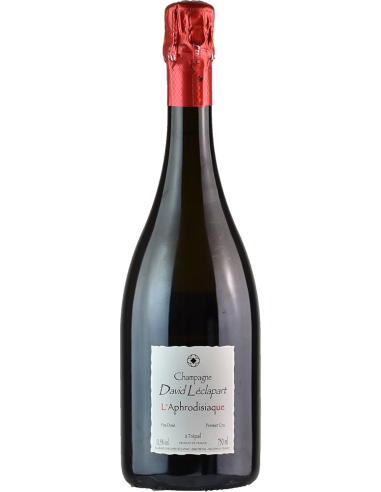



Champagne Pas Dosé 'L'Aphrodisiaque' by David Leclapart is an assembly of Chardonnay and Pinot Noir grapes grown in an organic and biodynamic regime, according to the philosophy of Leclapart which wants each wine to show its essence and characteristics without intervention. The pressed grapes and the must ferment in barrique, in a single upstream assembly. Six years on the lees follow. Rare champagne, complex, extreme, capable of arousing strong sensations… hence the name L'Aphrodisiaco.

- Product Category
- Champagne
- Production Method
- Champenois
- Designation
- Champagne AOC
- Blend
- Blanc de Noirs
- Cru
- Premier Cru
- Philosophy
- Biodynamic, Organic
- Grape / Raw material
- chardonnay
- Dosage
- Brut Nature - Pas Dosé
- Variety
- chardonnay 80%, pinot noir 20%
- Vintage - Cuvée
- 2016
- Size
- 750 ml.
- Country
- France
- Region
- FR - Champagne
- Alcohol Content
- 12.5% vol.
- Service Temperature
- 6° - 8° C.
- Suggested Glass
- Flùte transparent
- Food Matches
- Fish plates, Seafood - Shellfish, Raw Fish, Great Events, All Meal
- Allergens
- Contains Sulphites

On the death of his father, David Léclapart, in his early thirties, decides to return to the family business in Trépail, a small but productive wine company. David is stubborn and the decision is irrevocable: the entire small domaine of almost three hectares will be immediately converted to biodynamics. After a non-viticultural education, David is trained at the Beaujeu school of agrobiology, but he still has everything to learn in the field. His first vintage almost failed: "That year I made a lot of mistakes in the vineyard - he comments - and everything went wrong. I have hardly collected anything ». In 2000, three years have passed since the beginning of biodynamic conversion, the period of time that experts consider indispensable for the first tangible results. Another radical choice - never dose sparkling wines - adds further difficulties, because it highlights the slightest imperfection in execution and the smallest uncertainty in terms of health or grape ripeness. The very rainy 2001 is one of the worst vintages that Champagne, in the meantime, its '99 and 2000s are starting to get noticed by consumers and some attentive observers. David's first successes and the perfect health of the grapes - in a region with such a difficult climate - reassure the family and intrigue the villagers. The exclusion of any synthetic chemical product, the total and spontaneous grassing of the soil, the use of biodynamic preparations, do not satisfy the desire for naturalness of this winemaker. Since 2002, Léclapart has been carrying out an old project: sheep in the vineyard. These animals have a double advantage: they naturally mow the grass without damaging the vine and fertilize the soil by returning the native plant material in an elaborate form. «The sheep - says David - is an animal of light, we always need it in such a Nordic region. There is a complicity between the animal and the plant, which "feels" their presence. I also like the idea of giving the landscape a variety that the monoculture of the vine has almost canceled. I know that my fellow villagers take me for mad and that is why I tell them that sheep are only used for shearing and fertilizing ». Belonging to a rare Scottish breed, these animals can stay outdoors day and night in any weather. Léclapart borrowed them from a shepherd from the Ardennes, who will come to take them back in the spring. They are moved from one plot to another every 15/20 days, but obviously each vineyard must be fenced from time to time.
Address:
10 Rue de la Mairie, 51380 Trépail, France







